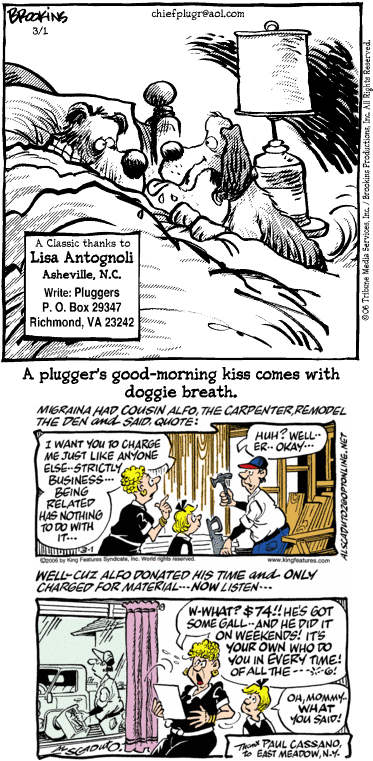Filth, foreigners, doom
Post Content
Pluggers, 4/24/06
![]()

I have tried — I mean, really, really tried — to restrain my college-educated, East Coast-dwelling, liberal urban elitism while reading Pluggers, holding my tongue as I am lectured day after day about how simple, down-home folks are morally superior to me. But this one really just pushed me over the edge, and I’m not what you’d call particularly clean. All right, Pluggers, listen up: If your response to spilling something on the floor is to aimlessly push it around with your sock, you live in filth, OK? I know your kitchen tile is already invisible under a layer of grime and sticky Fanta residue, but try to make a goddamn effort, for Christ’s sake. I hope social services comes and takes away your undernourished kids, the Humane Society comes and takes away your chained-up dogs, and the dentist comes and takes away the last of your meth-loosened teeth. And don’t try to tell me that you represent the “real America,” because I live in America and we have these things called paper towels.
Judge Parker, 4/24/06
![]()

Meanwhile, in the other America — the rich, white, freaky-red-haired-fright-wigged America — Sam and Abbey have turned from ruining Ned’s love life to cramping Sophie’s academic style. See, earlier this morning (by which I mean two weeks ago, JP-time), Abbey’s youngest received praise from her teacher on her latest school paper, which praised the concept of outsourcing. Today, the upcoming conflict is being telegraphed with a total lack of subtlety: Sophie is outsourcing her homework to India! This presumably includes the aforementioned paper about outsourcing, which may be a desperate attempt on the part of this strip that it does too understand the concept of irony.
Who’s to blame for this sad state of affairs? Evil, greedy CEOs, who have set a bad example to the nation’s youth by demonstrating that labor should be sought at the lowest possible prices, wherever you can find it? The Indians, for being so smart and yet working so cheaply that good old fashioned American fraudulant-paper-writers can’t compete? My vote goes to Sam and Abbey: I don’t care how many acres your estate is and how many pretty, pretty horses frolic prettily on it, nobody Sophie’s age (which is indeterminable due to crappy artwork, but is surely somewhere between 8 and 13) needs access to international wire transfer capabilities.
Sally Forth, 4/24/06
![]()

Boy, is Hillary in luck! She’s bonded with a moody goth girl just in time to learn about death!


